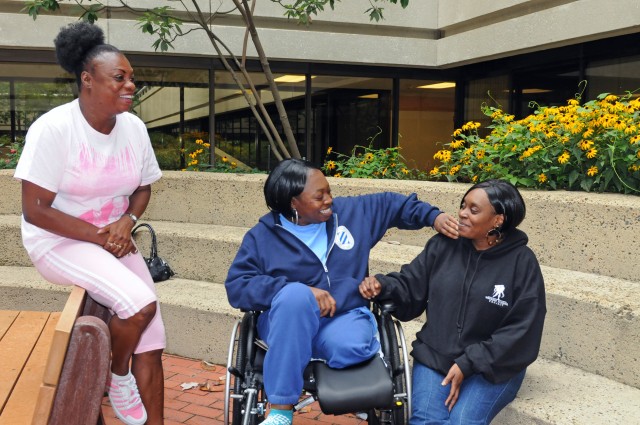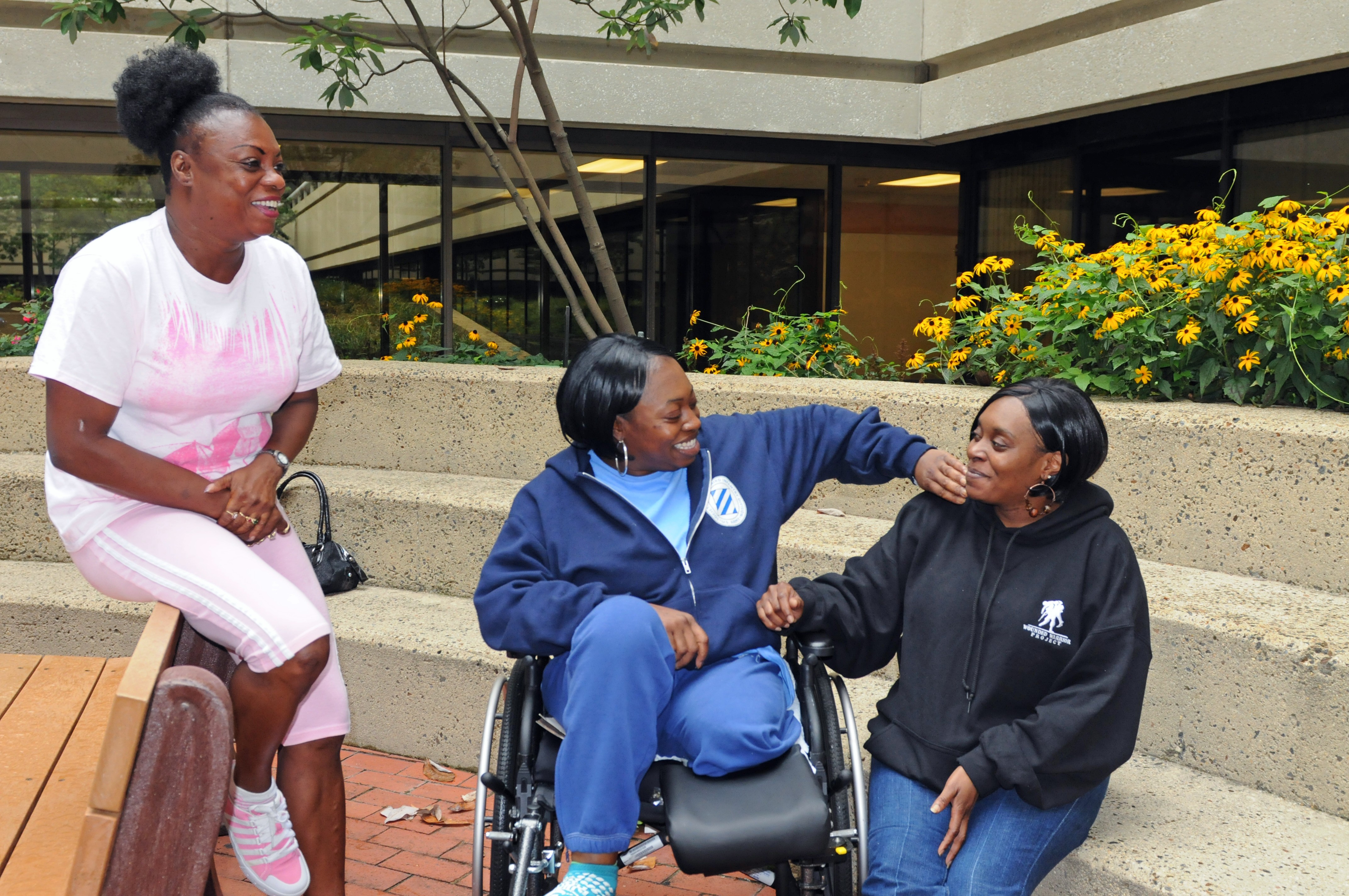<B> FORT STEWART, Ga. </B>- It might seem easy for a woman who's lost her leg to sink into depression. Questions such as "how will I work", "how can I take care of my family'", or "will I ever walk'" may cloud her mind, eventually forcing the immortal question, "Why did this have to happen to me'"
This wasn't the case for Staff Sgt. Reanita Gray, nor has it ever been. The automated logistical NCO with Headquarters, Headquarters Detachment, 260th Combat Sustainment Support Battalion was critically injured June 23 when an improvised explosive device hit her convoy in Iraq. No one was killed in the attack, which occurred about a month after the unit's arrival, but Staff Sgt. Gray lost her leg.
"It never crossed my mind to ask why did this happen to me," she said. "That's not the kind of faith I have. I have big-time faith."
Everything happened very quickly, she said, although she admitted that she doesn't remember everything. The convoy was returning to Camp Liberty, Iraq after conducting a mission as part of a Logistics Transition Assistance Team.
She said it was quiet that day because many of the Soldiers had gone to Tajhi. It was a short day, so the team planned to head back to their base, shower, and go to work.
Shortly after the convoy began, the left side of their vehicle was hit, knocking the gunner, Spc. Leo Loaza, from the turret.
"I heard a boom, pop, fizzle, like a firecracker," she said. "I didn't see anything."
Despite being badly injured, Staff Sgt. Gray and the gunner were pulled to safety by their truck commander Sgt. Percy Galmudge. He then applied a tourniquet to Staff Sgt. Gray's leg once he realized it had been severed in the attack.
"They were awesome, my TC and the medics. I truly believe if it wasn't for them, I'd be dead right now," she said. "They did an outstanding job."
During the medical evacuation back to Camp Liberty, she asked the medics and the others around her to pray with her.
"I never thought I would be on the end of some Soldier or someone lower ranking than me trying to save my life," she said. "It made me feel good to know that in all of that training we do, that somebody is paying attention and taking it seriously.
"As long as I live, I'll never forget that day," she continued. "I'll never forget how Sergeant Gamudge's face looked when he was doing first aid. I'll never forget how the medic's face looked when he was wrapping my leg and praying with me. I'll never forget how their faces looked when they pulled me out of the vehicle and put me on the helicopter. I'm truly thankful for each one of those people."
One of the first people she spoke with after the ordeal was her officer in charge, Warrant Officer 1 Michael Wells.
Because they had no communication equipment on the convoy, he received a message later that he needed to come into the office right away.
"I thought I was in trouble," he said. "When I got there, there was silence in the building; the kind you can cut with a butter knife. I knew something bad had happened, but I didn't know what."
He said he was shocked when he found out about the bombing, but he pulled together the Soldiers and broke the news to them, encouraging them to see the chaplain if they needed to.
Many of the Soldiers, he said, were shaken up, and some took the news very hard. Some were too frightened to go on missions. He said the younger Soldiers overcame their feelings when their senior NCOs spoke with them.
"They told them that no one can foresee anything like this happening," he said. "They said it's okay to feel the way they were feeling, but they had to bounce back from it."
If the Soldiers seemed worried about Staff Sgt. Gray, she was even more worried about them. Warrant Officers Wells added that once she was settled in the hospital, one of the first things she did was ask about the Soldiers.
"She was typical Sergeant Gray," he said with a laugh. "She was uplifted, which is not typical of someone who had been involved in this type of incident."
He added that although she'd only been working for him for two weeks before the incident, he could see that her concern for her Soldiers was real.
"She puts the Soldiers first and they knew it," he said. "They can sense that genuine concern. You can't fake that or read it from a book."
The rest of Staff Sgt. Gray's concerns lay with her husband, Robert Gray, and their five children, Dominque, Shaquana, India, Malik and Nadja.
"(The children) haven't really talked to me about it, but I know that they were really upset," she said. My youngest took it the hardest. I think they're just glad Mommy's here."
In her 20-year Army career, Staff Sgt. Gray has been stationed at Fort Stewart or Hunter Army Airfield three times, and was on her fourth deployment at the time of the bombing.
While in Iraq, she served a dual role of detachment noncommissioned officer in charge for the Combat Service Support Automations Management Office as well as a team leader for the Logistics Transition Assistance Team, which instructed Iraqi Soldiers and civilians on supply warehouse operations.
Yet, with all that she's done, she said she hasn't decided whether she will continue her Army career or retire.
"I've been asking myself if I have anything to give to the Army now. Would it be the same, or something just to keep me around'" she said. "I think I've done just about all that I can do for the Army. I've enjoyed my stay. The Army has been very good to me. I just don't know what else I could bring to make a big difference."
"Whatever she decides to do, we'll be behind her," Warrant Officer Wells said. "Even with the loss of her leg, she will make a big impact wherever she goes."
In the meantime, Staff Sgt. Gray is resting in Walter Reed Army Medical Hospital surrounded by her husband, birth mother Brenda Valentine, and sister Trulina.
Her walls and tables are covered with photos of her children and parents, Thomas Robert Lee and Trudy Mae Brown, and cards, gifts and flowers sent to her by the Soldiers in her unit.
Although she is still working on getting better and sometimes struggles with nightmares of the attack, her spirits remain high as she looks toward the future.
"I'm going to take one day at a time and let God lead me," she said. "The first thing to do is get well."
One thing is for sure. She doesn't regret a thing.
"Anything can happen anywhere," she said. "I chose to do this. I knew what could happen. You don't have to be on a convoy to get hurt."


Social Sharing